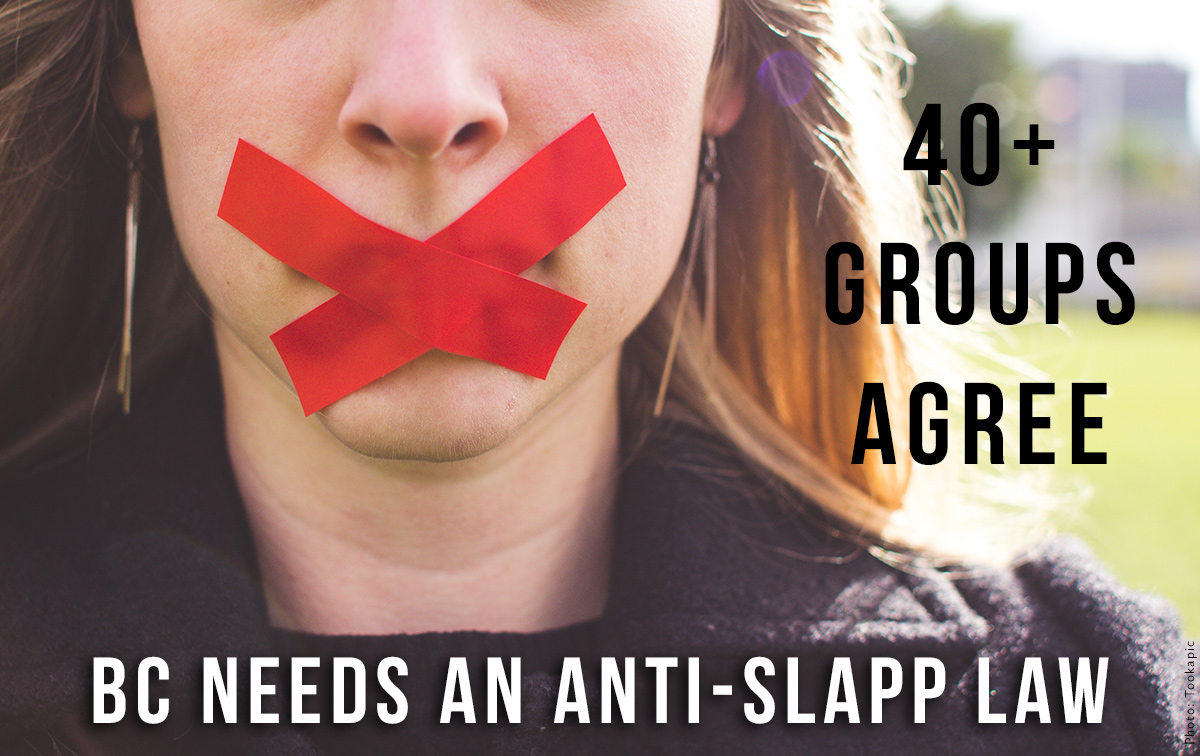
The neighbour of a composting facility is sued by its owner when she complains about odours and pests. An elderly couple arguing that a trail across private property is public receive a threatening letter from a lawyer telling them that they will be sued if they don’t stop talking about the trail. An island resident is sued when she reports illegal beach construction to her local government.
These are all real-life examples of British Columbians who have faced Strategic Lawsuits Against Public Participation, or SLAPPs – an abusive tactic through which powerful actors use the legal process itself to silence and intimidate their opponents.
This week, West Coast joined a diverse group of public interest advocates in welcoming the BC government’s recent commitment to enact an anti-SLAPP law.
Over forty organizations, ranging from the Union of BC Indian Chiefs to Canadian Journalists for Free Expression, signed an open letter to Premier Horgan and Attorney General Eby in support of legislation addressing SLAPP suits. The sheer number of groups and the variety of issues they work on is a testament to the breadth of the SLAPP problem in BC.
SLAPP suits can look quite different from one another on the surface – using many different legal theories and allegations – but they have a few unifying features.
- SLAPP suits generally do not have a strong evidentiary basis and are not necessarily intended to go to trial.
- These suits are meant to burden the defendant with costs and stress until the defendant disengages from the public debate or public process in which they were participating.
- SLAPPs are usually characterized by an imbalance of resources and bargaining power in favour of the plaintiff — for example, plaintiffs are often corporations while the defendants are typically individuals or small organizations without comparable resources.
Working as West Coast’s legal aid lawyer, I have seen firsthand the deep toll that SLAPP suits can take. When people or organizations are SLAPPed it is confusing, frightening, silencing. If a corporation drags you to court for speaking out, you may spend years fighting the case, distracting you from the real public issues that the corporation doesn’t want you discussing, and resulting in immense stress on your relationships and your health.
Even if the case never makes it to court, settling SLAPP suits still burdens defendants with financial and emotional costs they can ill afford. In other cases, people silence themselves rather than risk being SLAPPed by a powerful opponent.
We live in a participatory democracy – we are supposed to participate in public processes and voice our views in public debates. In a participatory democracy, SLAPP suits use the legal system to attack the very foundation of the social contract: the right and responsibility of citizens to participate in public life. As a lawyer I find that deeply offensive.
Our open letter follows last month’s call for made-in-BC anti-SLAPP legislation from a group of legal luminaries, including former NDP premier and attorney general Ujjal Dosanjh, former Liberal attorney general Wally Oppal and former Supreme Court justices Frank Iacobucci and Ian Binnie. This initial letter from high-profile judges and legal experts prompted Attorney General David Eby to commit to enacting such legislation in BC.
We look forward to working with the BC government to develop anti-SLAPP legislation that will protect freedom of speech and public participation in British Columbia’s unique context.
You can join the call to action against SLAPP suits! Sign our petition to tell the government that British Columbians want and need anti-SLAPP legislation for a healthy, flourishing democracy.